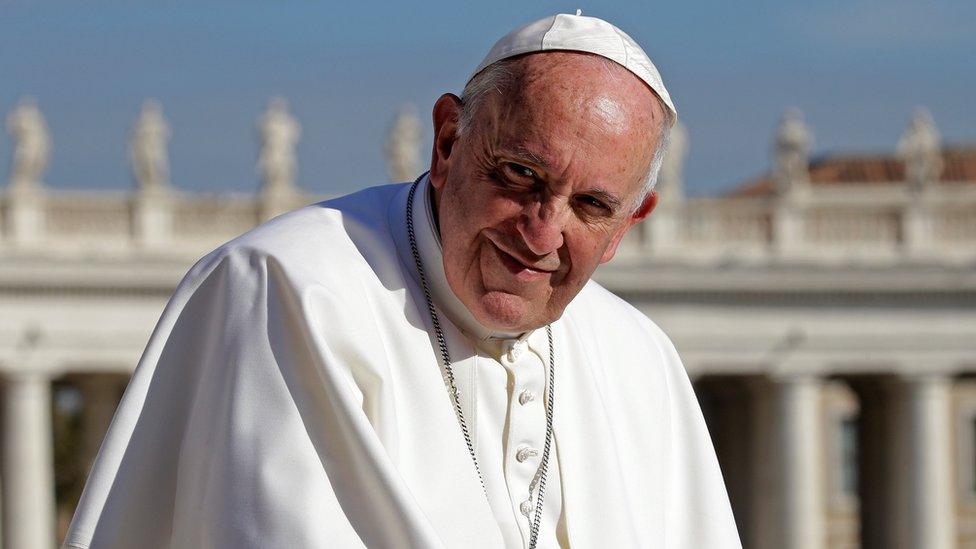Pope in Sri Lanka: Huge crowds for Colombo Mass
- Published
Pope Francis celebrated mass for a huge crowd in Colombo as Caroline Wyatt reports
Huge crowds have watched Pope Francis celebrate Mass in Sri Lanka, at which he canonised the nation's first saint.
The pontiff urged people to follow the example of 17th Century missionary Joseph Vaz at the service in Colombo.
The Pope, who has now travelled to a northern region that was devastated by a 26-year civil war, earlier called for the "pursuit of truth".
Government forces defeated the Tamil Tiger rebels in 2009, but both sides were accused of atrocities.
The authorities have so far refused to co-operate with a UN inquiry into war crimes.
The previous government consistently denied allegations that it was responsible for the deaths of many thousands of civilians in the final phase of the war.
The Tamil Tiger leaders are dead, so the Sri Lankan authorities have portrayed attempts to investigate as a one-sided witch hunt.
Pope Francis is trying to shift power within the Roman Catholic Church away from Europe and towards growing communities in Asia.
Hundreds of thousands showed up for the Pope's sea-front service at Galle Face Green, with many lining up from Tuesday to secure a place.
In keeping with his message of unity for Sri Lanka, Pope Francis urged its citizens to follow the example of Joseph Vaz and learn to overcome religious differences.
The Pope said St Joseph dedicated his life to the gospel message of reconciliation, and showed "the importance of transcending religious divisions in the service of peace".
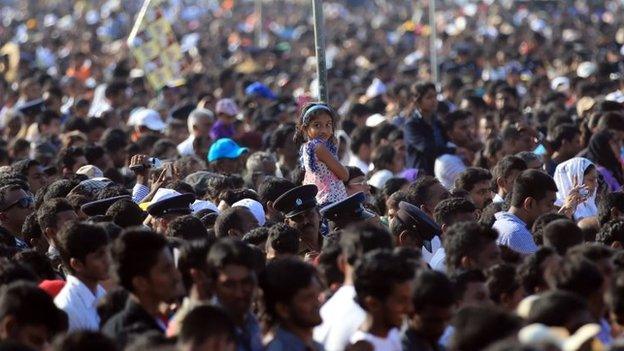
Hundreds of thousands turned out to see the Pope, including some from India
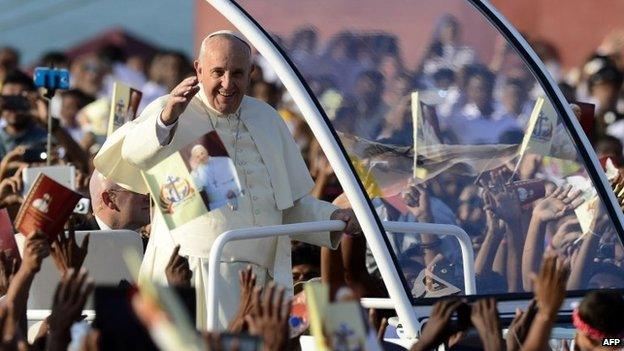
Pope Francis arrived early on Wednesday for the Mass in Colombo

At the scene: Caroline Wyatt, BBC News, Colombo
The atmosphere at Pope Francis's morning Mass was electrifying. Many of the faithful had camped out overnight to ensure a place. This morning, for hours ahead of the service, families with children of all ages sheltered under sun umbrellas as the heat intensified. They mingled with nuns dressed in all-white robes, sitting under the shade of their own black brollies. Many had travelled from Goa, birthplace of the missionary Joseph Vaz, who became St Joseph.
At the outdoor service by the beach in Colombo, the Pope said the missionary's life showed the importance of transcending religious divisions, emphasising that genuine worship of God bore fruit not in violence or hatred, but in respect for the sacredness of all life.
It was a message that struck a chord with many, after 26 years of fighting and tensions between the majority Sinhalese and the Tamil minority until the conflict ended in 2009. Although the deep scars of ethnic and religious divisions remain, there is a new sense of hope after last week's elections passed off peacefully and delivered Sri Lanka a new president.

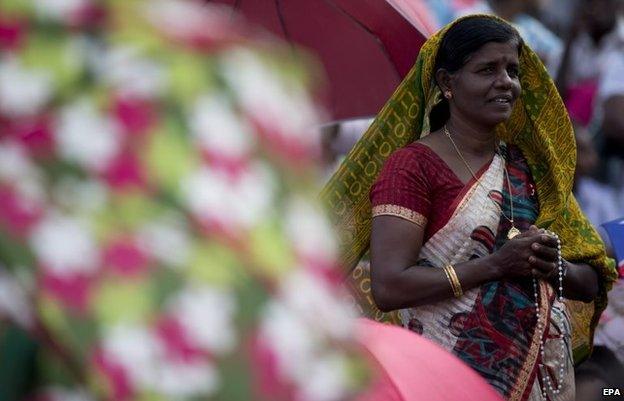
Pilgrims prayed before the arrival of the Pope in Madhu
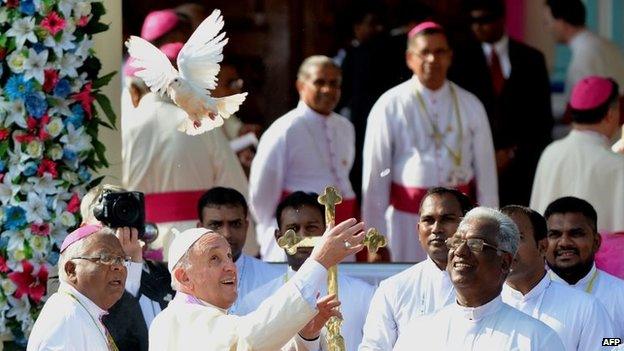
The Pope visited a shrine in Madhu and said there must be "reparation" for the "evil" Sri Lanka has suffered
The Church usually stipulates a potential saint must have two miracles attributed to them, but St Joseph has apparently been fast-tracked.
He is credited with just one miracle, whereby a pregnant Indian woman who was told that her baby was in danger prayed to St Joseph and the child was saved.
The BBC's Yogita Limaye in Colombo says there has been a great deal of enthusiasm for Joseph Vaz's sainthood, not just from the Catholic community of Sri Lanka but also from India's Catholic community.
Pilgrims came from all over Sri Lanka, and parts of India, to see the pontiff.
Pamela Mackay, 64, arrived in Colombo late on Tuesday night from her home about 100km (60 miles) away.
"What I'm feeling right now, I just can't describe," she said.
However, some Buddhist activists have objected to the canonisation and complain that the Catholic Church's violent campaigns during its early years led to the destruction of Buddhist temples.
Pope Francis' visit is part of a six-day tour of Asia which will also see him visiting the Philippines.

Who was Joseph Vaz?
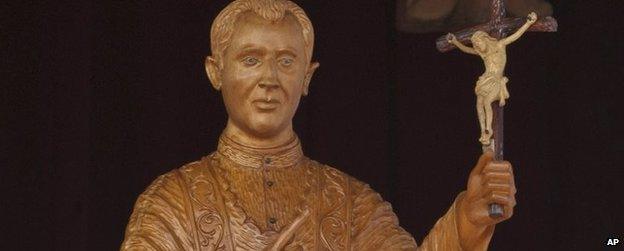
Born in Portuguese colony of Goa in 1651, arrived in Sri Lanka in 1687
Jailed multiple times by Dutch authorities for helping Catholics, dressed as a beggar to hide himself
Produced prayer books in Sinhalese and Tamil
By his death in 1711 he had earned himself the title Apostle of Sri Lanka

After the Colombo Mass, Pope Francis travelled to Madhu in the north, a region which saw some of the fiercest fighting in the war.
In a prayer at a local shrine, he said: "We ask also for the grace to make reparation for our sins and for all the evil which this land has known."
The long-running conflict arose from ethnic tensions between the majority Sinhalese and the Tamil minority.
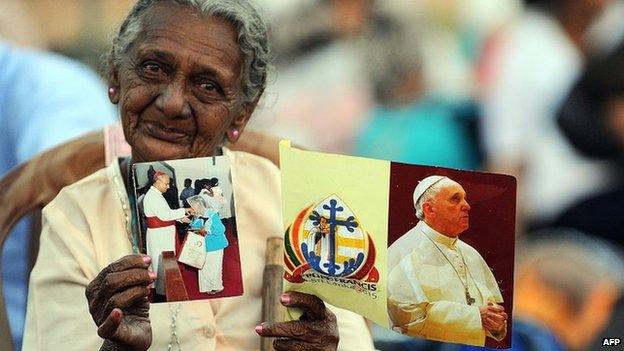
Crowds started to gather more than 24 hours in advance for the sea-front service
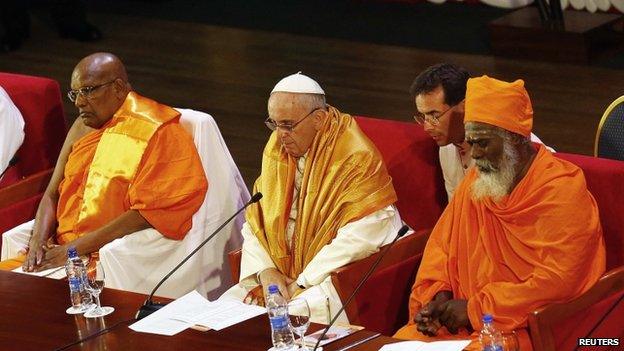
Pope Francis met leaders from many religious groups on Tuesday
More than one million Sri Lankans (about 7%) are said to be Christian, most of them Catholic. They include both Sinhalese and Tamils.
About 70% of Sri Lankans are Buddhist, with 13% Hindus and 10% Muslims.
The last papal visit was 20 years ago, when Pope John Paul II was boycotted by Buddhist leaders.
But on Tuesday, Pope Francis met a group of Buddhist, Hindu and Muslim leaders, urging reconciliation.
His visit comes amid change in Sri Lanka, where Maithripala Sirisena took office as president on Friday, replacing Mahinda Rajapaksa.
Correspondents say it is not yet clear if Mr Sirisena's approach to addressing the legacy of the conflict will differ from his predecessor, who is seen as a hero by many Sri Lankans for ending the conflict.
- Published14 January 2015
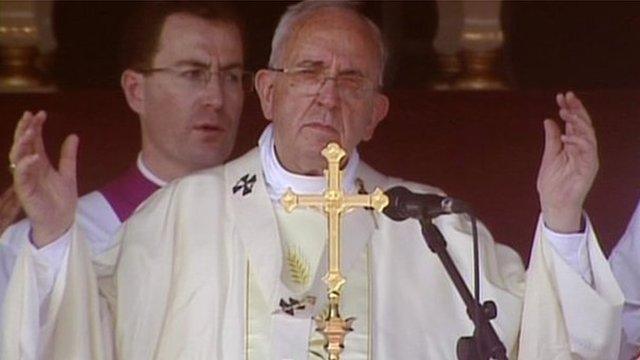
- Published13 January 2015
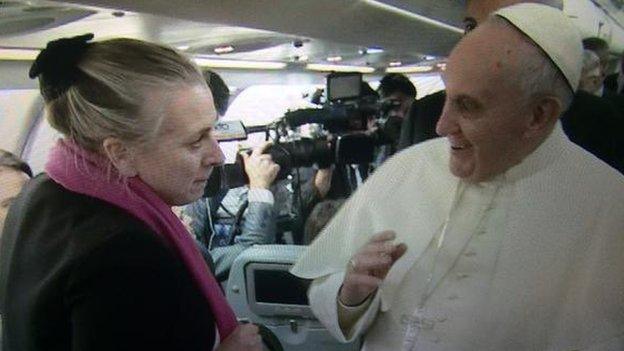
- Published3 October 2014
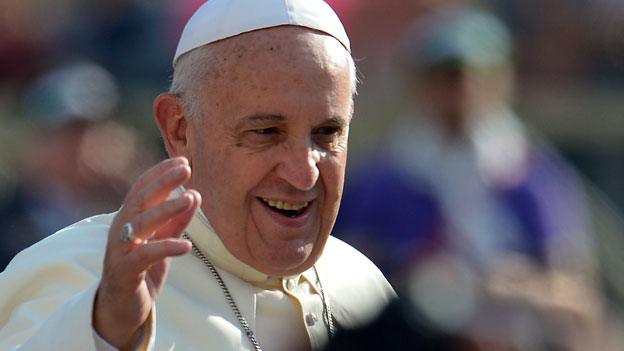
- Published7 January 2014
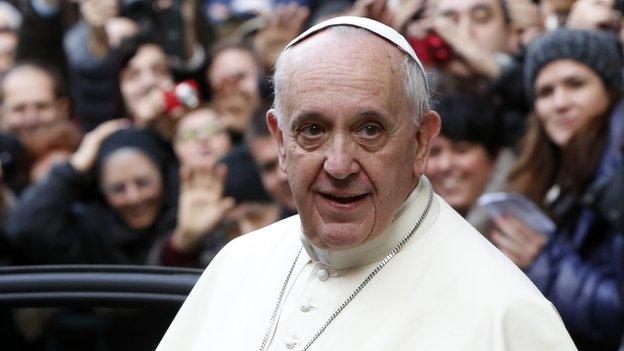
- Published28 October 2022
